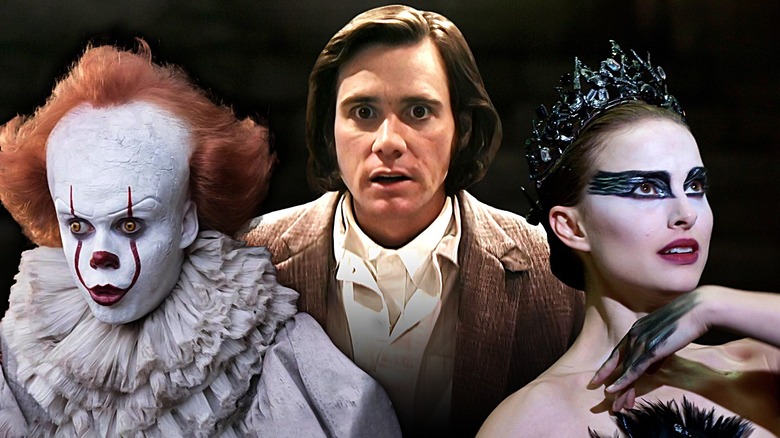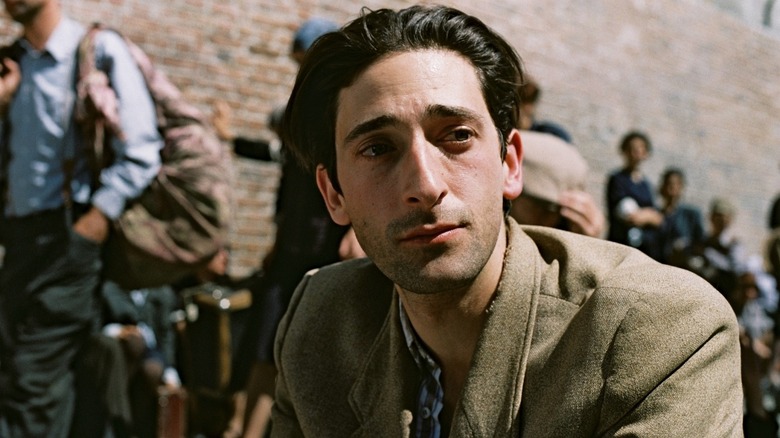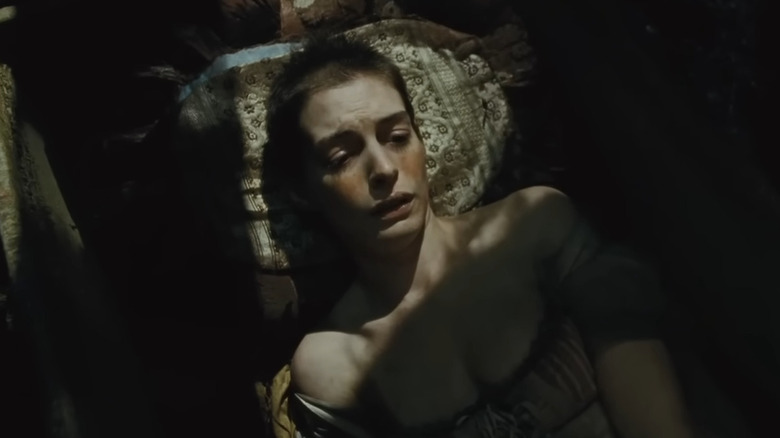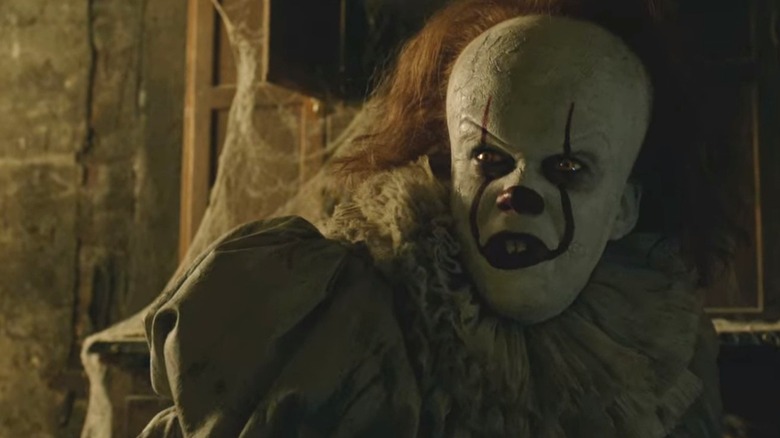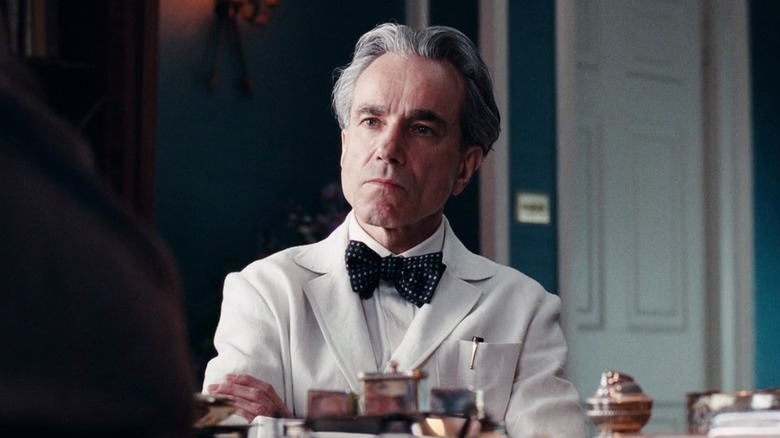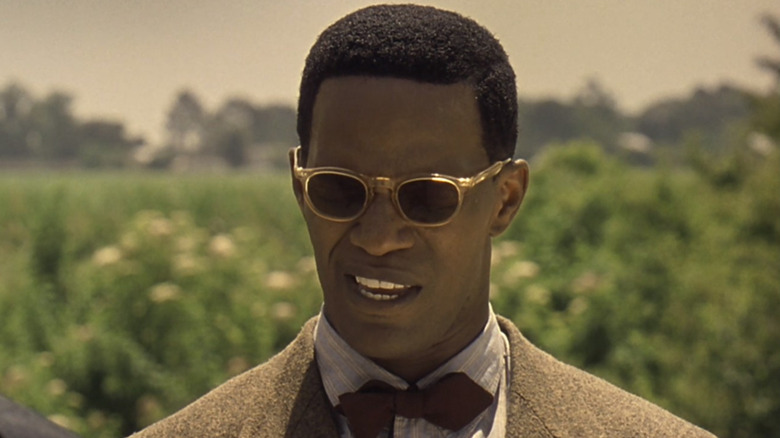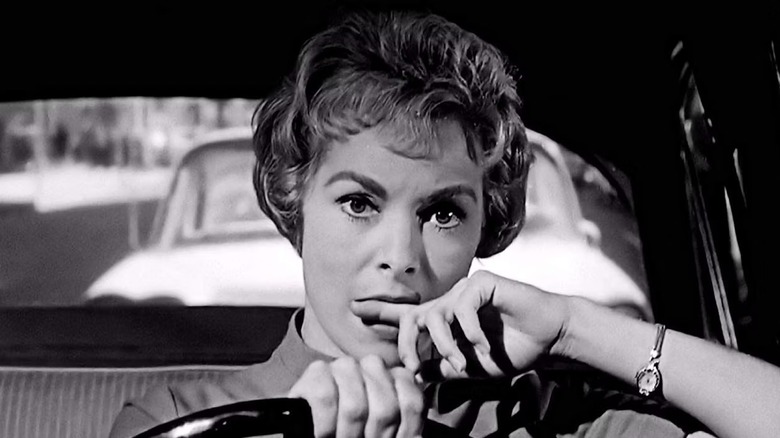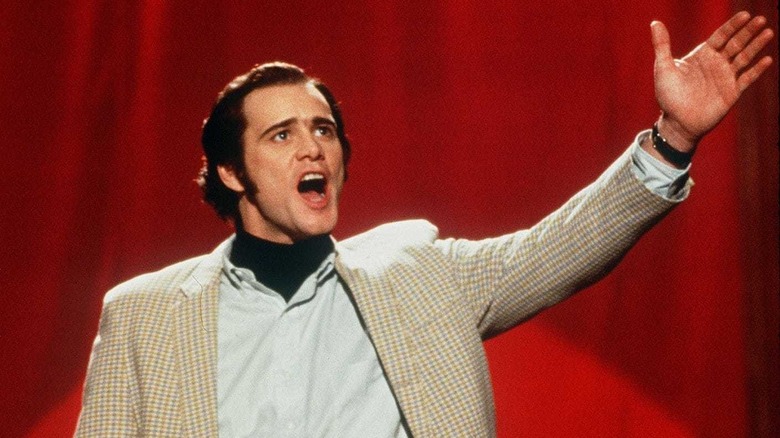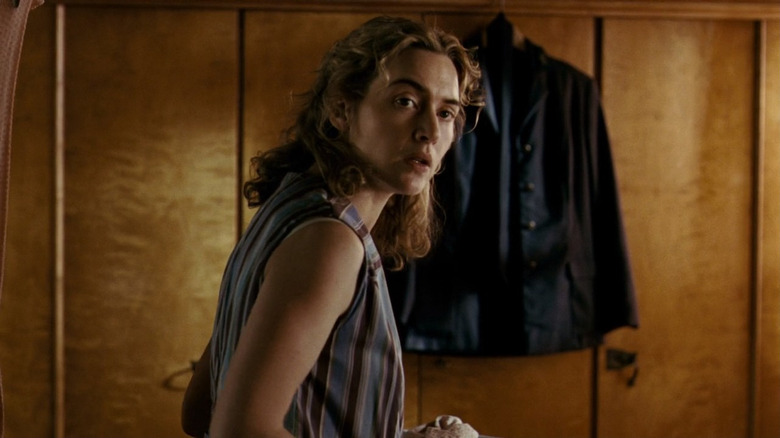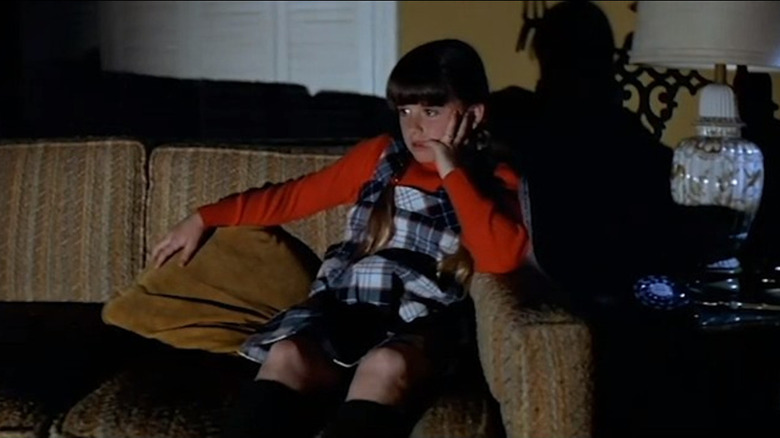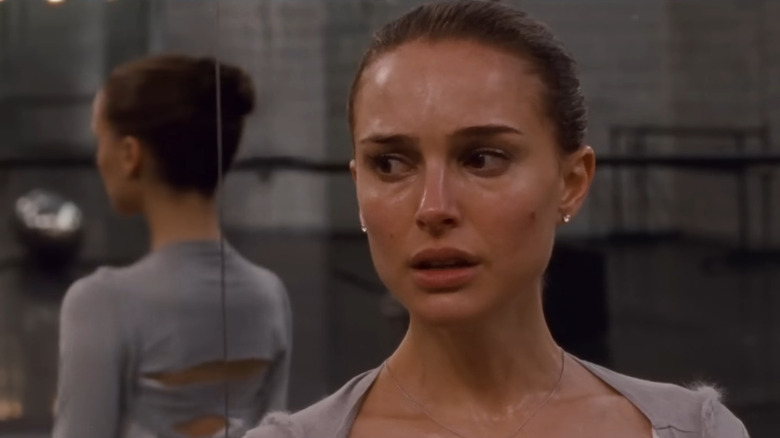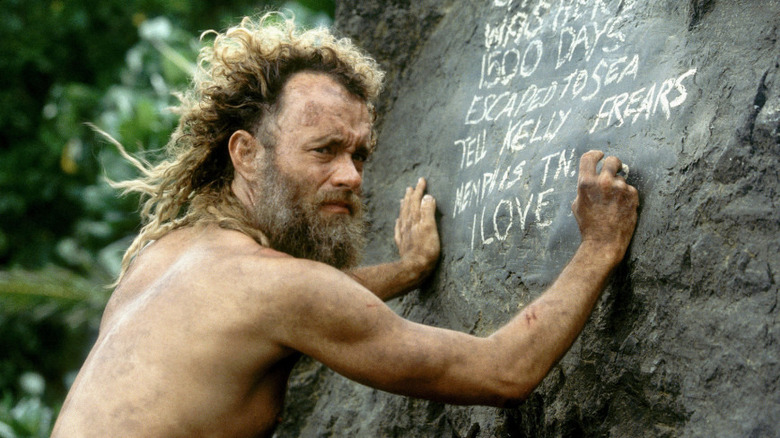Actors Who Were Traumatized By Their Movies
Actors regularly take it upon themselves to do everything they can to create a believable performance. Sometimes that means gaining or losing a significant amount of weight, other times it means working with a coach to nail a super-specific dialect. It may even mean adopting a new personality and utilizing Method acting to stay in character for the entire production. No matter what it is, every performer has a different way of immersing themselves in a project and preparing to play a character.
However, sometimes the preparation, production, or even seeing the movie after the fact can negatively impact an actor's mental health. For some, the physical or mental preparation becomes difficult to separate themselves from after production wraps, especially depending on the source material. For others, what they had to endure while filming, from what they pushed themselves to do or what the creative team asked of them, puts them in a negative state of mind. Here are some actors who were traumatized by their movies, from award-winning roles and unintentional swan songs to genre classics.
Adrien Brody was depressed for a year after The Pianist
Adrien Brody's role as Władysław Szpilman in the 2002 film "The Pianist" skyrocketed his career to new heights. While the actor's performance won him the Academy Award for best actor in a leading role, it also took a toll on Brody's mental health.
When "The Pianist" debuted, the actor candidly spoke about the troubles he faced after filming wrapped. He spent hours a day playing piano in preparation for the role and lost 30 pounds in order to accurately portray the character. To further prepare, he moved to Europe and lived fairly simply. "I gave up my apartment, I sold my car, I disconnected the phones, and I left," he shared with the BBC in 2003. "I took two bags and my keyboard and moved to Europe."
After changing his life that drastically, it was a major adjustment to come back home. "It took over half a year after the film was done to settle back into things," he explained. Over a decade later, Brody continues to discuss his experience with the project. "I was depressed for a year after 'The Pianist,'" he said at the Locarno Film Festival in 2017, as documented by IndieWire. "I was very disturbed by what I embraced [in making that film], and of the awareness that it opened up in me. But how much these things take from you changes project to project."
Anne Hathaway struggled physically and emotionally after Les Misérables
Anne Hathaway is easily one of the most well-known actresses working today, but many may not know the toll one of her characters took on her. Her role as Fantine in the 2012 film adaptation of "Les Misérables" meant a great deal to her because her mother was once part of a touring production of the musical. However, that didn't stop the preparation for filming and its aftermath from impacting her negatively.
Hathaway's preparation included losing 25 pounds through a cleanse and a diet limited to oatmeal paste. "I had to be obsessive about it — the idea was to look near death," the actress stated to Vogue. "Looking back on the whole experience — and I don't judge it in any way — it was definitely a little nuts." Her dedication to the character resulted in an Oscar-winning performance.
"I was in such a state of deprivation — physical and emotional," she shared. "When I got home, I couldn't react to the chaos of the world without being overwhelmed. It took me weeks till I felt like myself again." She credits her husband as her support system during that time. "The first time I really threw everything into a part, which was when I did 'Rachel Getting Married,' there was no one waiting for me when I got back," she continued. "This time, Adam [Shulman] was there. He gets what I do and who I am and supports me in it, and that's pretty awesome."
Bill Skarsgård dreamt of Pennywise after filming It
Bill Skarsgård has become known for his characters in horror movies, from Keith in "Barbarian" to Mickey in "Villains." However, it was his performance as Pennywise in the recent movie adaptations "It" and "It Chapter Two" that cemented him as a powerful force in the genre.
He terrified audiences with his portrayal of one of Stephen King's scariest creations, but not without some lasting impacts. In an interview with EW, Skarsgård discussed becoming Pennywise. "I liken every character that I do to a relationship that you're in. Pennywise and Bill go into this sort of relationship together," the actor shared. "It's just like being in a very destructive relationship."
Though he enjoyed playing Pennywise, after filming, the actor had "strange and vivid Pennywise dreams" in various forms while home in Sweden. "It was in the shape of either me dealing with him, sort of Pennywise as a separate entity of me, and then also me as Pennywise in circumstances that I didn't appreciate," Skarsgård continued.
Although he wasn't too disturbed by seeing the clown in his dreams, he was understandably relieved to break up with the character, as it were. "I likened it to an exorcism — him exiting my body and getting rid of the Pennywise toxins," the actor explained.
Daniel Day-Lewis quit acting after Phantom Thread
"Phantom Thread" put Daniel Day-Lewis into such a depression that he ended up retiring from the industry. The actor is known for portraying President Lincoln in "Lincoln" and Daniel Plainview in "There Will Be Blood," but it was playing Reynolds Woodcock, a dressmaker, that led Day-Lewis to give up acting.
A method actor, he prepared for the role by watching fashion shows from the 1940s and '50s, shadowing industry professionals, and even making his own garments. He dived into the creative process audiences see the character struggle with on-screen, and he did this without knowing it would be his final role. "Before making the film, I didn't know I was going to stop acting," Day-Lewis shared with W Magazine. The actor released a statement in the summer of 2017 that he would "no longer be working as an actor" just months before "Phantom Thread" was released.
"I knew it was uncharacteristic to put out a statement," he explained to W Magazine. "But I did want to draw a line." He notes that he and the film's director, Paul Thomas Anderson, were "overwhelmed by a sense of sadness" after making the movie. Day-Lewis admitted he hasn't seen the film and doesn't plan to. "But it's not why the sadness came to stay," the actor spoke about his decisions. "That happened during the telling of the story, and I don't really know why."
Jamie Foxx had panic attacks on the set of Ray
Jamie Foxx is a staple on screen, appearing in a variety of genres over the decades. His portrayal of Ray Charles in the biopic "Ray" is one of his most acclaimed roles, earning him the Academy Award, BAFTA, Golden Globe, NAACP Image Award, and SAG Award for best actor. While "Ray" cemented Foxx's place in the industry and is his most-awarded role to date, aspects of filming caused the actor to have panic attacks.
Director Taylor Hackford had Foxx's eyelids glued shut for filming. Instead of audiences seeing Foxx's eyelids, he wore prosthetics of damaged eyelids to mimic Charles' appearance. "Imagine having your eyes glued shut for 14 hours a day," Foxx shared with The New York Times. "That's your jail sentence." The actor struggled with this situation during the first two weeks of production. He felt claustrophobic and had panic attacks, and also couldn't see, a fact that other cast and crew members forgot about.
Foxx also transformed physically to play the famous musician. He lost 30 pounds from a combination of fasting, dieting, and working out to mimic Charles' appearance from liver disease. "There was a period of about four days when I was like, 'What the hell is going on with my body and my mind?'" the actor remembered, citing that it was difficult to go from eating healthily to the week-long cleanse that jump-started his weight loss.
Janet Leigh couldn't shower after Psycho
Janet Leigh's career spanned over five decades, but many will always remember her performance as Marion Crane in Alfred Hitchcock's "Psycho" as the one that put her on the map. The shower scene is easily one of the most recognizable — and incredibly scary — moments in all of cinema, even to this day. The actress agreed, discussing in a 1984 interview how she lived her life differently after filming wrapped.
"I stopped taking showers and I only take baths. When I'm someplace where I can only take a bath, I make sure the doors and windows of the house are locked," Janet Leigh shared with Ed Gross in 1984, who then published the interview on Woman's World in 2018. "I also leave the bathroom door open and shower curtain open. I'm always facing the door, watching, no matter where the shower head is." The actress was just as traumatized by the scene as the audience was.
Besides not taking showers after "Psycho," she also received worrisome fan mail. "There were people who were disturbed and who took 'Psycho' as a way to vent their unfortunate demons," she continued. "I really got a lot of letters where they told me that they were going to do the same thing to me that Norman Bates did to Marion Crane." The authorities were involved, and the frequency of the letters died down, but they were still frightening to receive.
Jim Carrey struggled with his beliefs after Man on the Moon
Jim Carrey is a comedy star, but that doesn't mean he hasn't dipped his toes into more dramatic waters. The 1999 biographical dramedy "Man on the Moon" is evidence of that. Carrey stars as Andy Kaufman, an entertainer struggling to find his place in the industry. It's based on the life of the real Kaufman, though some changes were made.
Pouring himself into the role, Carrey opted to stay as the character the entire time of production, even behaving in ways on set that he wasn't proud of. "Somewhere in the background, there's a little piece of Jim going, 'Oh, no, you're not going to do that,'" the actor shared with the Los Angeles Times. "But I was just along for the ride." Many of these interactions were filmed, but the footage wasn't released at the time.
Because he lived as the character for four months, the actor found it hard to return to himself. "I was looking back at myself and going, 'What the hell do I believe?'" the actor stated. "That was a process." Though difficult, Carrey learned more about himself during the experience. "The process over time has been, 'Oh, even that is not real. Even that is not solid.' It's disconcerting at first because it's a death," Carrey continued. "Sooner or later, I'm going to ascend out of that belief and understand: None of this is who I am."
Kate Winslet's preparation for The Reader traumatized her
Kate Winslet is known for a variety of roles, but playing Hanna Schmitz in "The Reader" was one of her hardest characters. It won her the Academy Award for best actress in a leading role, marking her first win after five previous acting nominations. The preparation she went through to be able to play Hanna, from Holocaust research to dialect training, is something that was a troubling experience for her.
"The Reader" is based on the book of the same name by Bernhard Schlink. Winslet shared in an interview with Huff Post in 2009 that it was "a terrifying position to be in" to adapt a character from a well-loved book — she felt that there were high expectations on her to properly capture Hanna, from her dialect to her illiteracy.
To prepare, the actresses dived into research on the time period. "Once you see documentary footage of the camp, you read anything on the Holocaust, you can never un-see those things, you can never un-hear, un-read them," Winslet continued. "I'm still absolutely haunted and traumatized by so much of what I saw during the preparation process. At a certain point I just had to stop, because I thought, 'I have what I need now; I get it. I really get it.'" Though it helped her prepare for the role, the material she saw left a mark on Winslet.
Kyle Richards was terrified after watching Halloween
Many may know Kyle Richards from her time as one of the main cast members of "The Real Housewives of Beverly Hills," but reality TV isn't where the actress got her start. Her career on-screen began with an episode of "Police Woman" in 1974. After that, she boasted 19 episodes in "Little House on the Prairie" and a variety of movies. Though not her first horror movie, "Halloween" is the one that scared her the most after filming wrapped.
She portrayed Lindsey Wallace in the first film of what would become one of the most well-known horror movie franchises of all time. "I was too young to grasp what was really going on [during filming]," Richards shared with Halloween Daily News in 2013. Thinking it was just "another Disney movie," her mother invited her best friend to the premiere.
"It was obviously not child-appropriate, and we both were traumatized," she continued. "I had no idea what I was in for." The movie scared her so much during the showing that Richards admits she changed her sleep patterns. "It was just really scary, and I really did sleep with my mom until I was 15 years old after that," she commented. Richards found herself always looking over her shoulder after seeing "Halloween," worried something — or someone — would jump out at her. "I think that's what sealed the deal for me to get out of horror films."
Natalie Portman felt aftershocks after Black Swan
One of Natalie Portman's best-known roles is Nina Sayers in "Black Swan." The story follows a young ballet dancer trying to prove herself, though she is competing against Lily (Mila Kunis), another dancer who embodies the Black Swan better than her.
Portman went through intense preparation before filming, including a year of ballet training several hours a day and a restrictive diet that caused her to lose 20 pounds. "There were some nights that I thought I literally was going to die," the actress shared with Entertainment Weekly, as archived by HuffPost. "It was the first time I understood how you could get so wrapped up in a role that it could sort of take you down." During training and filming, Portman endured several injuries, including a head injury that required an M.R.I., her toenails falling off, and a dislocated rib.
After production finished, the actress struggled to reacclimate to normal life. "I definitely felt both physical and mental aftershocks from the experience," she shared with MTV. "It was the first thing I've ever done that was this physically demanding on top of an emotionally demanding part." At the time, Portman acknowledged she would "figure out how it affected [her] in, like, five years." Over a decade later, she recognizes that while what she did wasn't method acting, she certainly has "gotten very into roles."
Tom Hanks heard Wilson in his head while filming Cast Away
Tom Hanks is a prolific actor, known for roles in "Forrest Gump" and "Big." One of his most notable characters is Chuck Noland in "Cast Away," a man trying to survive on an island with only a volleyball named Wilson for company. Chuck talks to the ball, and two decades later, the actor admits "he heard [Wilson's] dialogue in his head."
Hanks wasn't quite acting, noting that he could actually hear the volleyball speaking to him in his head during production in an interview with Graham Bensinger. He recognized that never having downtime contributed to his mental state. "I never had a shot off, I was never off camera for anything," he continued. "The whole movie was like point and shoot. I don't even recall hearing action and cut."
Hanks also underwent a significant physical change halfway through shooting, while director Robert Zemeckis was filming a different project. In an interview with Entertainment Weekly, the actor noted it was the director's idea to delay filming so he could lose weight and look like someone with little food on a deserted island. Hanks missed "those fries from France" the most while on a diet to lose 55 pounds before production restarted.
He struggled with the impacts of filming, both physical and psychological, mostly because "there wasn't ... anyone else to work off of."
